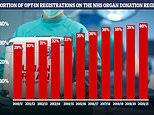Spike in people signing up to donate their organs through NHS app
Spike in people signing up to donate their organs through NHS app after 12million downloaded it for their Covid vaccine passports
Some 265,000 new organ donors have registered through the NHS appApp is used to prove Covid jab status and millions have downloaded it since MayMore than 12million downloaded it app after the Covid Pass was introduced
<!–
<!–
<!–<!–
<!–
(function (src, d, tag){
var s = d.createElement(tag), prev = d.getElementsByTagName(tag)[0];
s.src = src;
prev.parentNode.insertBefore(s, prev);
}(“https://www.dailymail.co.uk/static/gunther/1.17.0/async_bundle–.js”, document, “script”));
<!–
DM.loadCSS(“https://www.dailymail.co.uk/static/gunther/gunther-2159/video_bundle–.css”);
<!–
England has seen a spike in people signing up to be organ donors through the NHS app this year, figures show.
A total of 265,000 new donors have registered through the software, with 150,000 of them doing so between May and September.
The surge in the summer came as millions of Britons flocked to the app when the Covid Pass feature was introduced and domestic passports looked likely.
No10 started flirting with the idea of using proof of jab papers in bars, restaurants and other indoor settings in spring but has held off so far in England.
The measure has been brought in in Scotland, however and a decisions will be taken in Wales in the coming days.
More than 12million Britons have downloaded the NHS app after the Covid Pass was introduced, allowing people to prove their vaccination status with the click of a button.
In total 1.5million people in England have agreed to donate their organs when they die, according to the Department of Health and Social Care (DHSC).
Around 150,000 people have registered to donate their organs after downloading the NHS app for their Covid vaccine passports
Around 40 per cent of the population of the UK have ‘opted-in’ to the organ donation register — around 26million people. Everyone in England is assumed to have opted in but people are able to opt in so their family are aware of their decision when they die
Max and Keira’s Law, named after a boy who received a heart transplant from a girl who donated it, cleared the House of Commons in 2019. Max Johnson (left) was saved by a heart given to him by the family of nine-year-old donor Keira Ball (right) following her death in 2017
The proportion of people opting in to organ donation across the UK increased from 39 per cent in 2019 to 2020 to 40 per cent in 2020 to 2021 — and jumped by more than a quarter in a decade.
An ‘opt-out’ system known as the Max and Keira law came into effect last year, which means everyone in England is automatically considered a donor unless their family requests otherwise after their death.
The law is named after Keira Ball, who died aged nine in 2017, and Max Johnson, now aged 13, who was saved by her heart.
All adults in England are now considered to have opted-in to organ donation in an effort increase the number of donors.
Following the law’s arrival in May last year, families are still consulted before organ donation goes ahead.
They have the power to overturn any decision if they weren’t sure their loved one wanted to donate, the NHS says.
But signing up on the app allows people to notify their family of their decision digitally and also put in their preference as to whether they want an NHS staff member to explain how organ donations can be in line with their religious beliefs.
It also allows them to amend which particular organs they do or do not wish to donate after they die.
Head of the NHS Organ Donor Register at NHS Blood and Transplant Alex Hudson said: ‘Since the new organ donation law came into effect, our priority has been to ensure that each person knows that organ donation is still a choice.
‘By enabling people to check, amend and update their organ donation decision, the NHS app makes it easier than ever for people to manage and control their own organ donation decision.
‘Even though organ donation has changed to an opt-out system, it is important for people to be aware that families will still always be approached before organ donation goes ahead.
‘When a person has proactively registered their organ donation decision, we know this provides great comfort and reassurance for families at what is an incredibly difficult time.’
Speaking at London Tech Week, Health Secretary Sajid Javid welcomed the ‘enormous’ benefits of technology in transforming health and care.
‘We all owe so much not just to our doctors, nurses and colleagues on the front line but also the coders, developers and innovators who helped our NHS stay so strong,’ he said.
‘We’ve seen what health tech can do at a time when health systems around the world were under incredible strain.
‘We must build on the progress that we’ve all seen and deliver this long-awaited digital revolution.’
Over the last four months, almost 3.2million repeat prescriptions were also ordered within the app, while more than 268,000 GP appointment bookings were made.
Announcing the the opt-out donation law last year, officials said it would mean an extra 700 transplants each year by 2023, helping thousands of people across the UK waiting for a transplant.
But they stress that donating organs remains a personal decision. When the new system starts in May families will get the final say.
But doctors hope the ‘presumed consent system’ will mean more relatives give the go-ahead.
They say relatives often decide not to give permission for organs to be removed because they do not know what their loved one would have wanted.
And the NHS app’s new function of allowing donors to notify the family of their decision is also expected to help ensure organs are correctly donated.
![]()


